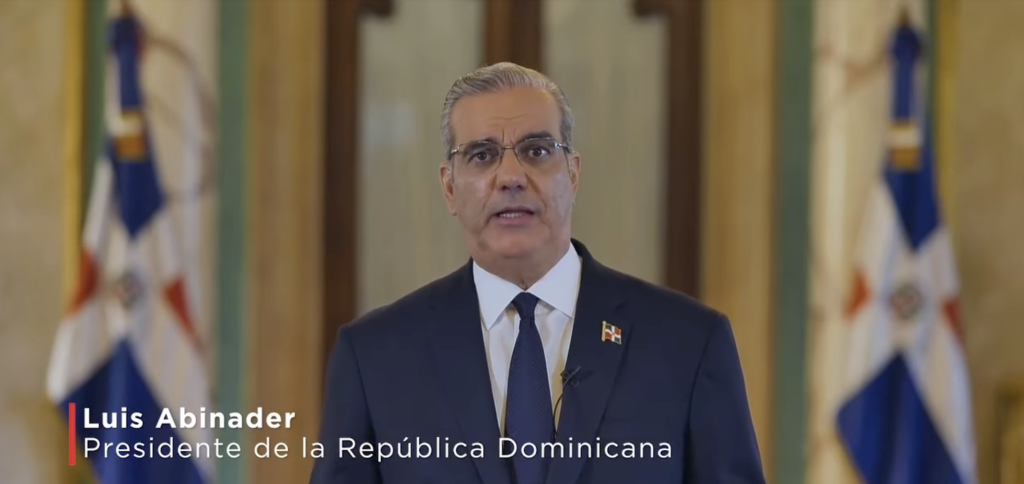
President Luis Abinader addressed the nation on Sunday, 6 April 2025 to announce 15 actions the country is taking to reinforce border control and check migration with Haiti. “We will not allow the spill off of violence in Haiti to the Dominican Republic,” said Abinader when addressing the country.
The address was unusual because the President regularly speaks to the nation on Mondays, during his weekly press conference. The announcements came after Foreign Minister Roberto Alvarez described Haiti as the country’s main problem and the border with Haiti as a “revolving door,” referring to the ease with which persons deported return promptly to the country. Alvarez had called for people to pressure for more consequences to people smuggling. The Dominican Republic shares a 320 km land border with Haiti with four main official crossing points and 54 km of border fence.
The President stated on Sunday: “I recognize that many are concerned because of the threat Haiti represents, concerned because of the irregular migration it generates, concerned because of the load it represents for our hospitals, our schools, the risks for our security and the burden on our economy. We know what happens beyond our border, we know that Haiti is going through its darkest days of its history because of the multiple crisis – security crisis caused by criminal gangs that control their territory, an environmental crisis resulting in deforestation and lack of water, an economic crisis with the lack of production means, a political crisis with the absence of democratic institutions and the worst of all crises, the crisis of the irresponsible abandonment of the international community that has left Haiti to its own luck.”
“None of these crises have we caused us, but all have consequences that are impacting us,” he said. Nevertheless, he said that governments for decades have let the crises to spiral out of proportion.
Among the measures is the submitting to Congress of a draft for Migration Law reform introducing harsher penalties for those facilitating illegal immigration, including officials, landlords, and employers. At present, the penalties are not sufficient to discourage the breaking of the law and assisting undocumented migration.
Other measures include the reorganization of the three border brigades into six operational areas, each led by a senior officer.
The deployment of an additional 1,500 soldiers to the border, joining the 9,500 already stationed there.
The acceleration of the border wall construction, with an immediate bidding process for an additional 13 kilometers, building on the 54 kilometers already completed.
The addition of 750 new immigration agents.
The expansion of immigration control offices across all provinces.
Changes to the operation regulations of border markets to curb illegal entry under the guise of commercial activities.
A proposal to create a Special Prosecutor’s Office for Immigration Affairs.
Coordination with local governments to facilitate repatriations.
The establishment of a Citizen Observatory on Immigration Policy, coordinated by journalist Miguel Franjul, executive editor of Listin Diario.
Starting 21 April 2025, a protocol will be implemented in public hospitals requiring foreigners to provide identification, proof of employment, and a local address. Failure to comply will result in repatriation once patients are stabilized. Each hospital will have a designated immigration officer. There are mayor complaints the medical assistance to Haitians has been displacing service to Dominicans. In the border, most of the patients are Haitians.
The appointment of jurist Milton Ray Guevara to lead a commission tasked with reviewing immigration regulations. Ray Guevara is the retired president of the Constitutional Court.
The promotion of “Dominicanization” in employment sectors such as free zones and tourism, with salary increases of up to 30%. The President says these jobs have to be made more attractive to Dominican employees, now being displaced by Haitian workers.
The compatibility between the Supérate social program and employment in construction and agriculture. He said employees will be allowed to keep their Superate benefits while taking on other jobs.
An expansion of Bandex’s fund to mechanize and industrialize the agricultural and construction sectors, reducing their reliance on illegal labor. The mechanization is intended to reduce the local dependence in agriculture and construction on low cost Haitian labor.
Read more:
Presidency
Noticias SIN
Diario Libre
N Digital
Listin Diario
Desclasificado con Addis Burgos
7 April 2025

